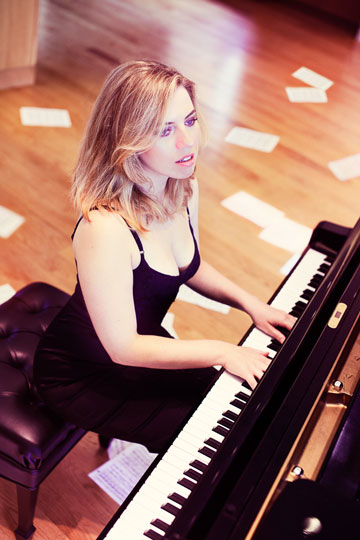Pianist Natasha Paremski makes her BPO debut
by Jan Jezioro

Tchaikovsky Meets Brahms
Music Director JoAnn Falletta returns to the podium at Kleinhans Music Hall to conduct BPO concerts Saturday, February 7 at 8pm and Sunday, February 8 at 2:30pm. The exciting young Russian-American pianist Natasha Paremski will be making her BPO debut in Brahms’ Piano Concerto No.1 in D minor in a program that includes Tchaikovsky’s Symphony No.2 in C minor and the Diversions Overture by Jack Gallagher.

Now based in New York City, Natasha Paremski, who was born in Moscow, moved with her family to the United States at the age of eight and became a US citizen in 1991. After debuting with the Los Angeles Philharmonic at the age of 15, she won several very prestigious young artists’ prizes at a very young age, including the Gilmore Young Artists prize in 2006 at the age of 18 and the Prix Montblanc in 2007. The 2010 Classical Recording Foundation’s Young Artist of the Year, Paremski has recorded two discs with the Moscow Philharmonic Orchestra under Dmitry Yablonsky, the first featuring Anton Rubinstein’s Piano Concerto No. 4 coupled with Rachmaninov’s Rhapsody on a Theme of Paganini and the second featuring all of Chopin’s shorter works for piano and orchestra. Paremski has also recently recorded Britten’s Sonata for cello and piano, with cellist Zuill Bailey, a BPO audience favorite.
The gestation period for Brahms’ first piano concerto was particularly difficult and prolonged. In 1853, the composer Robert Schumann wrote his famous, last piece as a music critic, where he hailed Brahms as “one of the elect,” and a genuine successor to Beethoven. Wonderful praise, indeed, but also a heavy burden to bear for the twenty year old Brahms, who became a close friend of both Schumann and his wife Clara, even as Robert began to suffer auditory and visual hallucinations, eventually being committed to an asylum after trying to drown himself in the Rhine in 1854. Brahms’ piano concerto started out as a sonata for one piano, then for two, before morphing into the then longest concerto ever written, with Brahms turning repeatedly to the conductor and violin virtuoso Joseph Joachim for critical advice. While the small city premiere in Hanover was successful, the second performance in Leipzig was a disaster. Brahms, however, was not discouraged and the work finally gained its rightful place as one of the handful of masterpieces for piano and orchestra.
Tchaikovsky’s Symphony No.2 in C minor, was a great audience favorite from the start. Because he made very effective use of three Ukrainian folk songs in the work it was nicknamed the “Little Russian” by Nikolay Kashkin, a friend of the composer who was a well-known Moscow music critic. While in the 19th century the Russians often referred to the Ukraine as “Little Russia,” after the traumatic events of the 20th century, and especially in light of the current Russian sponsored terrorism in Ukraine, the term has become anathema to Ukrainian nationalists.
While these performances of Jack Gallagher’s Diversions Overture will be the first BPO performances of a work by this contemporary American composer, Falletta has programmed his works with one of her other orchestras, the Virginia Symphony, and she has recorded a favorably Naxos CD devoted to his music with the London Symphony Orchestra. Of Diversions, one critic observed “for a moment you might feel that you are listening to a lost work from the English pastoral school, not quite Vaughan Williams, but possibly E.J. Moeran or John Ireland. Gallagher’s individuality soon reasserts itself, however, in the music’s quick sections.”
BPO New Music Readings—EarShot
The BPO, the American Composers Orchestra and the EarShot Network will present a day of orchestral readings on Wednesday February 11 in Kleinhans Music Hall. The event will include professional development workshops for young composers and composition students from noon to 5pm, as well as a public reading of the music of four selected composers at 7pm. The composers chosen for the readings, Cody Forrest, Jay Hurst, Yuan-Chen Li, and Scott Ordway, were selected through a national call for scores and will receive feedback from BPO musicians and associate conductor Stefan Sanders, and mentor composers Robert Beaser of The Juilliard School, Rob Deemer from SUNY Fredonia, and Pulitzer Prize winner Melinda Wagner.
Cody Forrest, a doctoral student at New England Conservatory, was a recipient of the 2014 ASCAP Morton Gould Young Composer Award for his piece To See the Stars Again. Jay Hurst, a composer from Cape Canaveral, Florida, is pursuing a DM at Indiana University’s Jacobs School of Music, where he also serves as an associate instructor in composition. Composer Yuan-Chen Li, who credits her Taiwanese upbringing, Buddhist spirit, and Western musical knowledge as the inspiration behind her work is completing a Ph.D. at the University of Chicago. California native Scott Ordway, who joined the faculty of the Curtis Institute of Music in 2014 had 35 performances of his orchestral, choral, chamber, and multimedia works throughout the US and Europe in 2013-2014.
The 7pm event is free and open to the public.
Information: www.bpo.org
blog comments powered by Disqus
|
Issue Navigation> Issue Index > v14n5 (Valentines Issue, Week of Thursday, February 5) > Pianist Natasha Paremski makes her BPO debut This Week's Issue • Artvoice Daily • Artvoice TV • Events Calendar • Classifieds |









 Current Issue
Current Issue